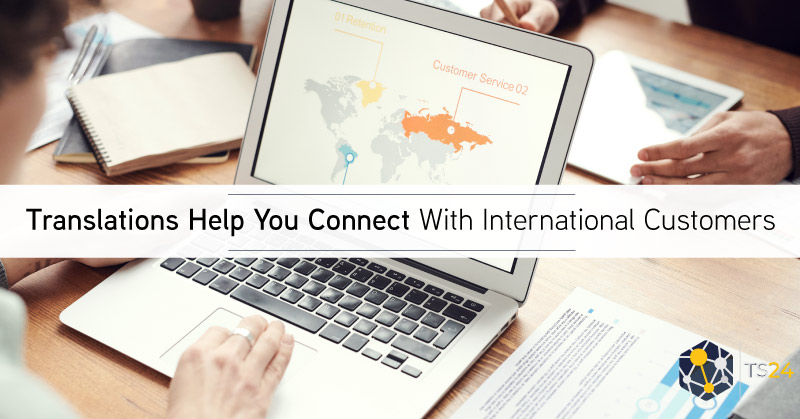How Can Translation Services Help Your Business Grow Internationally
Expanding into new, foreign markets offers companies the opportunity to diversify their operations and sell products and services globally.
However, there are numerous local and global factors to consider, including go-to-market strategy, creating strong partnerships, local hiring, and understanding of international customer needs.
One of the biggest challenges businesses face is overcoming the language barrier for effective communication with local suppliers, customers, and stakeholders.
This guide provides valuable tips for businesses looking to expand globally, boost profitability, improve ROI, and increase market share and talks about how professional translation services can help your business grow within the international and multilingual marketspace.
Expand Your Market Internationally
Whether you’re in the logistics industry, manufacturing, service sector, or retail, you can expand into non-English speaking markets with the help of a professional marketing translation service.
By reading this article, you will learn tips for effectively reaching out to international clients and growing your business in new markets. These strategies will help you overcome language barriers and gain a deeper understanding of local customer needs, allowing you to build strong, successful relationships with clients in new markets.
Market Evaluation and Research
The customer is always the most important factor in a company’s success, not the product. Before entering a new market, it’s essential to conduct thorough market research to understand consumer needs, market opportunities, and local competition.
The main objective of any global business should be to comprehend their target customer’s purchasing habits, willingness to buy, and buying patterns.
While researching international markets, it’s crucial to keep the following factors in mind:
- Political and economic factors
- Market segmentation, size, and demographics
- Industry growth indication
- Forecast trends
- Market size
You can benefit from advanced software and tools like Google Trends to search for popular products and services in the target country. Once you have the above data and insights, you can devise an effective marketing strategy to connect to locals.
Connect to Audiences with Translation Services
To establish a local presence in new markets, companies must create and implement a multi-lingual strategy. Although the internet is used by 4.9 billion people, the majority are not proficient in English.
To effectively reach a new audience, the first step is to develop content in the local language. This can be achieved by creating blogs, website content, and promotional materials that are accessible and meaningful to the local audience. By doing so, companies can build trust and credibility with their target market and establish themselves as local brands.
Searching Local Partners and Suppliers
Partnering with local marketing companies and digital agencies can greatly enhance a brand’s image and reach in international markets. Building strong relationships with these local partners will enable companies to engage with customers more effectively and increase customer engagement through collaborative marketing campaigns. Additionally, partnering with local vendors and suppliers for inventory, publishing, logistics, and delivery is crucial to success.
When looking to establish a physical presence in a new market, it’s best to hire locals who have a deep understanding of the market, competition, and consumer demands. This will help to build trust and credibility with local clients, whether the target market is B2B or B2C.
Customised Business Model and Brand
Successful localisation requires businesses to adapt their models to meet the varying demands of international markets. This includes tailoring factors such as packaging, instructions, messaging, and ingredients to meet local language needs. It’s also crucial to have a comprehensive understanding of local laws and regulations to ensure compliance and success in new markets.
Localisation is a key aspect of global expansion and companies that invest time and resources into ensuring their products and services meet local needs will have a better chance of success.
The following steps will help you localise your brand:
- Understanding regional language, culture, religion, societal, and environmental issues.
- Adapting business messaging, articles, products, and websites for local use.
- Modifying business pitches and presentations to address local issues and problems backed by thorough research.
- Incorporating colours, layouts, visuals, graphics, and images representing local culture.
Keep a Close Eye on Local Competition
Digitalisation certainly offers numerous opportunities for companies to grow globally. However, it leads to more competition and aggressive marketing campaigns.
The key to success in a monopolistic competitive market is to offer product differentiation to attract customers. You need to ask yourself the following questions before exploring any overseas market:
- What unique selling point (USP) gives you a competitive advantage?
- What’s your target audience and their purchasing power?
- Which marketing channels will you use, including TV, radio, social media, website, promotion, distributors, billboards, etc.?
The local markets in Japan for instance have different customs compared to that in the UK. Companies should spend sufficient time understanding the local and global competition and consumers’ responses to the offered products.
One strategy that emerging businesses often implement is a pricing model lower than their competitors to capture the market share. It’s an old tactic that may work for a short while but may not always be successful.
McDonald’s is the most successful global company due to the following two reasons:
- Localisation
- Standardisation
They understand local consumers and competition and then offer a menu at a price that the consumers can afford. That’s why their restaurants are different across the globe, such as in Japan, Germany, Pakistan, the UK, and the USA.
Price Discrimination
One of the biggest mistakes businesses commit while expanding their operations is offering fixed pricing across the globe.
As an example, customers in one part of the world may have lesser purchase power compared to those in another region.
This is why market research and analytics teams are integral in pricing products according to the demographics and serving regions.
Conclusion
Successful companies recognise the power of technology and the internet in growing their business by reaching international markets. A key aspect of this expansion is effective localisation and translation services, which enable companies to connect with local customers and build lasting relationships.
Thorough research of global markets and an understanding of regional languages are crucial components of a successful localisation strategy. By prioritising localisation, businesses can maximise their revenue potential and achieve sustained growth.
About the Author
Translation Services 24 (TS24) is a professional London translation agency offering expert services in over 200 languages. We work with clients in all corporate and public industries and specialise in sector-specific linguistic solutions. With over a decade of experience in the industry, 15+ million words converted every year and 100,000+ projects completed, TS24 is a leading provider of expert translations and interpretation services and an officially certified member of the ATC. Contact TS24 here.
Follow Translation Services 24 on Social Media








